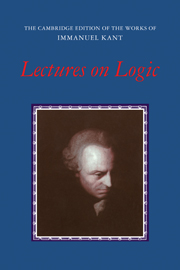Book contents
- Frontmatter
- Contents
- General editors' preface
- Acknowledgments
- Translator's introduction
- PART I The Blomberg logic
- PART II
- PART III The Dohna-Wundlacken logic
- PART IV The Jäsche logic
- Preface
- Introduction
- I Universal doctrine of elements
- II Universal doctrine of method
- PART V Appendixes
- Explanatory notes
- Name index
- Subject index
II - Universal doctrine of method
Published online by Cambridge University Press: 05 June 2012
- Frontmatter
- Contents
- General editors' preface
- Acknowledgments
- Translator's introduction
- PART I The Blomberg logic
- PART II
- PART III The Dohna-Wundlacken logic
- PART IV The Jäsche logic
- Preface
- Introduction
- I Universal doctrine of elements
- II Universal doctrine of method
- PART V Appendixes
- Explanatory notes
- Name index
- Subject index
Summary
Manner and method
All cognition, and a whole of cognition, must be in conformity with a rule. (Absence of rules is at the same time unreason.) But this rule is either that of manner (free) or that of method (compulsion).
Form of science – Method
Cognition, as science, must be arranged in accordance with a method. For science is a whole of cognition as a system, and not merely as an aggregate. It therefore requires a systematic cognition, hence one composed in accordance with rules on which we have reflected.
Doctrine of method – Its object and end
As the doctrine of elements in logic has for its content the elements and conditions of the perfection of a cognition, so the universal doctrine of method, as the other part of logic, has to deal with the form of a science in general, or with the ways of acting so as to connect the manifold of cognition in a science.
Means for furthering the logical perfection of cognition
The doctrine of method is supposed to expound the way for us to attain the perfection of cognition. Now one of the most essential logical perfections of cognition consists in its distinctness, thoroughness, and systematic ordering into the whole of a science. Accordingly, the doctrine of method will have principally to provide the means through which these perfections of cognition are furthered.
- Type
- Chapter
- Information
- Lectures on Logic , pp. 630 - 640Publisher: Cambridge University PressPrint publication year: 1992

